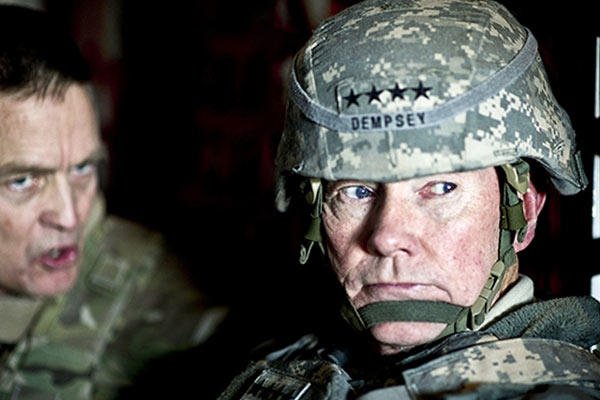The U.S. will need a detailed assessment on the remaining capabilities of a demoralized Iraqi army before deciding on further military support against Islamic State of Iraq and the Levant, Gen. Martin Dempsey said Tuesday.
Dempsey, the chairman of the Joint Chiefs of Staff, said he wanted answers to several questions on the Iraqi forces before advising President Obama on a course of action.
"Will they hold? What's their makeup? Are they still a force that represents all Iraqis?" Dempsey asked.
"When we have that assessment in hand," Dempsey told reporters after a speech in Honolulu, "we'll make some decisions about whether there's other kinds of support that we can provide."
The current government of Prime Minister Nouri al-Maliki has pleaded with the U.S. to conduct airstrikes and speed up arms shipments but the U.S. "didn't have enough information to understand what kind of assistance we could provide," Dempsey said.
U.S. support will be partly conditioned on the Iraqis' ability to form a new government representative of the Shia, Sunni and Kurdish communities, said Dempsey.
"Their ability to find political reconciliation among groups and to present an inclusive face to the people of Iraq who are counting on them to lead will be an important factor in determining what we do going forward," Dempsey said.
The U.S. currently has about 750 troops in Iraq, with about 180 from an authorized number of 300 engaged in an assessing and advisory mission to the Iraqi security forces.
To gain a better assessment, six teams of about 12 U.S. troops led by senior officers have been fanning out across Baghdad to meet with Iraqi troops at the brigade level and higher, Dempsey said.
However, political reconciliation among the Iraqi factions would still be "an important factor in determining what we do going forward," Dempsey said.
There appeared to be little prospect for quick formation of a new government. The parliament was supposed to convene Tuesday but the only action taken was to postpone the session until sometime next week.
The stalemate in parliament and the advances by ISIL made the partition of Iraq more of a possibility.
In Irbil, capital of the semi-autonomous Kurdish Regional Government, Kurdish President Massoud Barzani said he was preparing for a referendum on independence.
"Everything that's happened recently shows that it's the right of Kurdistan to achieve independence," Barzani told the BBC.
"From now on, we won't hide that that's our goal. Iraq is effectively partitioned now," Barzani said. "Are we supposed to stay in this tragic situation the country's living? It's not me who will decide on independence. It's the people. We'll hold a referendum and it's a matter of months."
-- Richard Sisk can be reached at richard.sisk@monster.com































